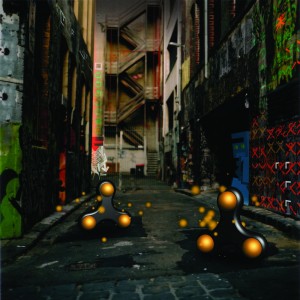Troy Innocent is a digital artist creating experimental games. Much of his work investigates the semiotics of generative meaning systems.

'Habitat', Iconica, Troy Innocent
Can you outline your current project?
I am currently developing a game mod investigating the posthuman bodies of signs that are constructed by the contemporary game AI. Iconic projectiles in this First Person Shooter do not cause physical damage, but instead manipulate the bot’s mental state to trigger changes in the AI. The project draws on models of human behaviour and psychology to generate these symbols, creating an ‘illusion of mind’ in the game bot.
What first attracted you to computer games as an art form?
Way back, I was inspired by their aesthetics and codes in the 8-bit days of the 80s, and then later-generation 3D systems in the 90s. My interest in digital media language led to an investigation of the code, structure, rules and logic of games.
There is an engagement with process that occurs when playing a game, an ongoing human-machine dialogue that is rich in meaning and potential expression. Computer games enable the construction of worlds and ways of being that are not only represented, but are experienced. This immediacy and capacity to animate life into an alternative world can allow an experience of the other, or an alien logic.
You often illustrate – and deconstruct – symbolic forces activating virtual environments. What makes this process so compelling for you to perform in digital games?
I am interested in what may be described as ‘generative meaning systems’ – hybrid forms that blend digital games, generative systems and computational semiotics. Players in these systems become an integral part of the simulation in a series of feedback loops and couplings.
There is also a certain aesthetic beauty in data structures and their expression as musical-visual forms. LifeSigns explored these ideas through the construction of a persistent world that evolved and mutated in response to play. It attempted an interaction that is not only reactive, but functions as a collective conversation with its audience. Computer games are possibly one of the most complex media in terms of how they construct meaning. Even a single-player game has a lot going on; networked games increase this complexity an order of magnitude.
How do you see your outcomes informing game design practice?
The separation of a model and its expression opens up interesting possibilities. Game mods remap and mutate existing systems, allowing new interpretations of meaning. Drawing attention to the fluid, mutable nature of digital realms through freeform, synaesthetic play with meta-ontologies suggests alternative communication strategies made possible by the unique language of the space.
This shift has also impacted upon a generation that grew up with games and now has an innate knowledge of systems and processes. It has become second nature for many people to make abstractions of reality in terms of systems, processes, flows, and models. It is a very different way of looking at the world.
Rebecca Cannon
Rebecca Cannon is a Cultural Business software developer and consultant, with over a decade’s experience delivering and advising projects for the creative and entertainment digital media industries. A creative Media Artist with Computer Science and Business Management qualifications, she has an in depth knowledge of creative content delivery.
Read More
http://www.iconica.org/main.htm
Watch More
This work Colony draws upon Innocent’s digital media arts practice that explores the connections between artificial systems such as language and natural processes abundant in life.
 This work is licensed under a Creative Commons Attribution-NonCommercial-ShareAlike 2.5 Australia.
This work is licensed under a Creative Commons Attribution-NonCommercial-ShareAlike 2.5 Australia.






